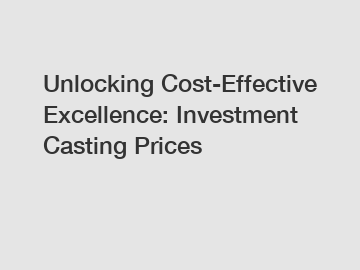Unlocking Cost-Effective Excellence: Investment Casting Prices
You will get efficient and thoughtful service from Abu.
Investment casting, also known as lost-wax casting, is a versatile and cost-effective manufacturing process. It allows the production of highly intricate, complex, and durable metal parts with excellent dimensional accuracy. However, one crucial consideration that businesses must carefully evaluate is investment casting prices. In this blog, we will explore the key factors that influence investment casting costs and provide insights into obtaining cost-effective excellence without compromising on quality.
Understanding the Investment Casting Process.

Before delving into investment casting prices, let's briefly understand the investment casting process. This technique involves creating a wax pattern or a replica of the desired part. This pattern is then coated with a refractory ceramic material to form a mold. Once the mold is created, the wax is melted and removed, leaving behind a cavity that is later filled with molten metal. After the metal solidifies, the mold is broken, and the finished part is obtained.
Factors Influencing Investment Casting Prices.
1. Part Complexity:
The complexity of the part significantly impacts investment casting prices. Intricate designs with undercuts, thin walls, or complex internal features tend to be more challenging to create. They require additional steps in the process, such as multiple wax injections, extra coats of ceramic material, or the use of soluble cores, which contribute to increased costs.
2. Material Selection:
The type of material used has a direct impact on the overall cost. Different metals and alloys have varying price points due to their availability, demand, and refining processes. More common materials like steel or aluminum are generally more cost-effective compared to exotic alloys or precious metals.
3. Batch Size:
Investment casting is capable of producing both small and large batches of parts. However, the economy of scale comes into play when considering investment casting prices. Larger quantities typically yield lower costs per unit due to optimized material usage, reduced setup time, and improved efficiency during the production process.
4. Tolerance and Surface Finish Requirements:
Stringent tolerance and surface finish requirements often demand additional effort, time, and precision in the investment casting process. Achieving tight tolerances or superior surface finishes may involve extra machining, polishing, or additional quality control measures, which can impact the overall cost.
5. Tooling and Setup Costs:
The creation of molds or tooling is an essential part of the investment casting process. These initial tools contribute to setup costs, which are amortized over the production run. Consequently, larger production quantities can help spread the setup costs, reducing the unit cost.
6. Partner Selection:
Choosing the right investment casting partner is vital for achieving cost-effective excellence. Reputable foundries with extensive experience, expertise, and advanced technologies have the capability to optimize the production process, minimize waste, and maximize yield. Such trusted partners can provide valuable input during the design phase, ensuring cost efficiency without compromising quality.
Obtaining Cost-Effective Excellence.
1. Design Optimization:
Collaborating with a knowledgeable investment casting partner during the design phase allows for design optimization to reduce unnecessary complexity, minimize material usage, and streamline the production process. Design modifications that improve mold complexity, part consolidation, or material selection can significantly impact investment casting prices.
2. Materials Rationalization:
Working with experts to evaluate and rationalize material selection based on part requirements can help achieve cost savings. Identifying suitable alternatives without compromising on functionality or performance can lead to substantial reduction in investment casting costs.
3. Process Efficiency:
Streamlining the manufacturing process through efficient tooling design, optimized gating and running systems, and minimizing secondary operations can result in significant cost savings. An experienced investment casting partner will use their expertise to suggest improvements and implement techniques that enhance process efficiency without compromising quality.
4. Batch Planning and Forecasting:
Collaborating closely with your investment casting partner for accurate batch planning and forecasting can help optimize production runs, minimize setup costs, and reduce overall lead times. A well-planned production schedule ensures timely delivery without incurring additional costs associated with rush orders or expedited production.
Conclusion.
Investment casting prices are influenced by multiple factors, including part complexity, material selection, batch size, tolerance requirements, and tooling costs. By intelligently evaluating these factors and collaborating with an experienced investment casting partner, businesses can unlock cost-effective excellence without compromising on quality. Design optimization, materials rationalization, process efficiency, and effective batch planning are crucial elements that can yield significant cost savings. Partnering with a trusted foundry that possesses extensive experience, expertise, and cutting-edge technology will ultimately result in the successful realization of cost-effective, high-quality investment castings.
You can find more information on our web, so please take a look.
For more information, please visit ceramic slurry for lost wax casting.



